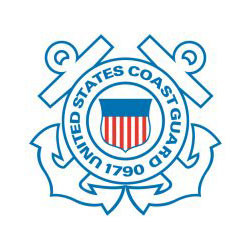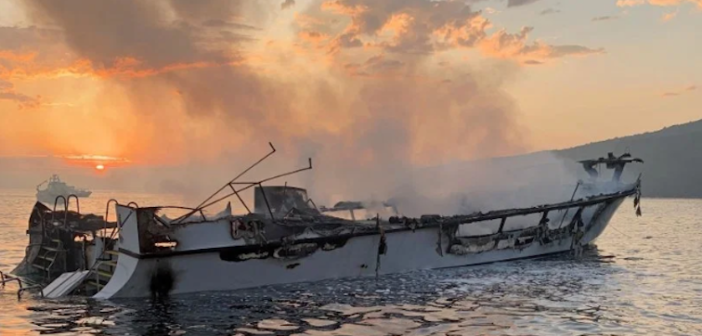The Coast Guard announced in the Federal Register late last year that it is issuing an interim rule as the first step to implementing the statutorily mandated requirements for fire safety on certain covered small passenger vessels.
The mandate is in response to the fire and loss of life on the dive boat Conception off the coast of California on Sept. 2, 2019. The interim rule includes additional fire safety requirements for small passenger vessels, including fire detection and suppression systems, avenues of escape, egress drills, crew firefighting training, watchmen monitoring devices, and the handling of flammable items such as rechargeable batteries.
Section 8441 of the Elijah E. Cummings Coast Guard Authorization Act of 2020 (2020 CGAA) amended Title 46 of the U.S. Code (U.S.C.), section 3306, which now directs the secretary of the Department of Homeland Security (DHS) to prescribe fire safety regulations for certain “covered small passenger vessels,” defined as small passenger vessels (SPVs) with overnight accommodations for passengers or operating on Oceans or Coastwise routes, excluding fishing vessels and ferries. (See Pub.L. 116-283, Jan. 1, 2021.) The 2020 CGAA added a new paragraph to section 3306 which requires the DHS secretary to issue interim requirements to cover the following eight provisions:
- Marine firefighting training programs to improve crewmember training and efficiency, including egress training for each member of the crew.
- Interconnected fire detection equipment and additional fire extinguishers and firefighting equipment in all areas on board where passengers and crew have access.
- Installation and use of monitoring devices to ensure wakefulness of the required night watch (for covered SPVs with overnight passenger accommodations).
- Increased fire detection and suppression systems in unmanned areas with machinery or areas with other potential heat sources.
- No less than two independent avenues of escape for all general areas accessible to passengers, that are constructed and arranged to allow for unobstructed egress, located so that one avenue od escape is not available, another avenue of escape is available, and not directly above, or dependent on, a berth (for covered SPVs with overnight passenger accommodation).
- Handling, storage and operation of flammable items, such as rechargeable batteries, including lithium-ion batteries.
- Requirements for passenger emergency egress drills (for covered SPVs with overnight passenger accommodations.
- Providing all passengers a copy of the emergency egress plan for the vessel (for covered SPVs with overnight passenger accommodations).
A detailed explanation of the changes in each category is included in the interim rule on the Federal Register.
This interim rule is effective March 28, 2022, except for amendatory instruction numbers 13, 14, 29, and 31 adding of § 122.507(b), amending 122.515, adding 185.507(b), and adding 185.515(a), respectively, which are delayed indefinitely. The Coast Guard will publish a document in the Federal Register announcing the effective date of those additions.
Comments and related material must be received by the Coast Guard on or before June 27. Comments on the collection of information must be received by the Coast Guard on or before Jan. 26.
You may submit comments identified by docket number USCG-2021-0306 using the Federal Decision Making Portal at https://www.regulations.gov.
For information, call or email Lt. Carmine Faul, Coast Guard; telephone 202-475-1357, email [email protected].




